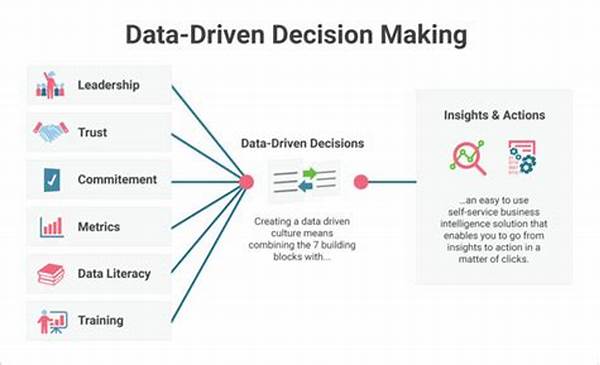The role of data in shaping educational strategies has emerged as pivotal in the contemporary educational landscape. As schools strive to enhance learning outcomes and operational efficiency, the adoption of data-driven decision-making becomes increasingly indispensable. This methodology not only fosters an environment where informed decisions are made but also leverages quantitative insights to address complex educational challenges. This article delves into the significance and application of data-driven decision-making in schools, exploring its transformative impact on educational processes and outcomes.
Read Now : Expert Realtor Skills Enhancement
The Significance of Data-Driven Decision-Making in Educational Institutions
Data-driven decision-making in schools operates as a cornerstone that significantly influences administrative and academic strategies. By employing data analytics, schools can identify trends, patterns, and insights that were previously obscured by traditional decision-making paradigms. This approach enables stakeholders to tailor educational experiences to meet diverse student needs effectively. Moreover, it facilitates the allocation of resources towards areas that demonstrate the highest potential for improving educational outcomes.
The significance of this approach is underscored by its ability to track and assess student performance at a granular level. Data-driven decision-making permits educators to monitor individual student progress and identify areas requiring intervention, thereby personalizing instruction to cater to unique learning styles. It empowers teachers with evidence-based strategies that foster student engagement and achievement, creating a more responsive educational environment.
Additionally, the integration of data-driven decision-making in schools supports the formulation of policies that are grounded in empirical evidence. By analyzing comprehensive datasets, school administrators can develop strategic plans that align with institutional goals and respond proactively to emerging challenges. This systematic approach to decision-making not only enhances transparency but also fosters accountability, ensuring that educational practices are both effective and equitable.
Implementing Data-Driven Decision-Making in Schools: Key Components
1. Data Collection: Effective data-driven decision-making in schools begins with robust data collection practices that capture essential academic and operational metrics.
2. Data Analysis: Schools must employ sophisticated analytical tools to process and interpret collected data, deriving actionable insights that inform decision-making.
3. Data Interpretation: Educators and administrators need to possess the capability to interpret data correctly, ensuring that decisions are based on accurate and relevant information.
4. Implementation Strategy: Establishing clear implementation strategies facilitated by data insights ensures that educational interventions align with school objectives.
5. Continuous Monitoring: Ongoing monitoring and evaluation of educational strategies, informed by real-time data, are crucial for sustained improvements and adaptation.
Challenges and Solutions in Data-Driven Decision-Making
Implementing data-driven decision-making in schools poses several challenges that require careful navigation. A primary concern is the acquisition and maintenance of high-quality data, which necessitates the investment in and adaptation of modern data management systems. Schools must establish infrastructures that facilitate seamless data integration across various educational platforms.
Additionally, there exists an ongoing need for professional development opportunities that equip educators with the skills to analyze and interpret data effectively. By providing training programs focused on data literacy, schools can bridge this gap and empower staff to utilize data confidently in their decision-making processes. Moreover, addressing privacy concerns and ensuring the ethical use of student data remain paramount to maintaining trust and compliance with legal standards.
Benefits of Data-Driven Decision-Making in Schools
Enhancing Educational Outcomes
Data-driven decision-making in schools facilitates personalized learning experiences and identifies intervention points to enhance student achievement.
Supporting Educator Effectiveness
Educators benefit from insights derived through data-driven approaches, optimizing their teaching methods.
Read Now : Guide To Acing Campus Interviews
Resource Allocation and Efficiency
Data-driven strategies promote efficient resource use and budget allocation in schools.
Policy Formulation and Institutional Planning
Comprehensive data analysis supports effective policy formulation and strategic planning in schools.
Accountability and Transparency
The adoption of data-driven decision-making in schools enhances transparency and accountability to stakeholders.
Enhancing School Culture
Data-driven decision-making nurtures a culture of continuous improvement and collaborative problem-solving.
Increasing Student Engagement
By utilizing data insights, schools can tailor engagement strategies to cater to diverse student interests and motivations.
Future Prospects of Data-Driven Decision-Making in Schools
As educational environments become increasingly dynamic, the relevance of data-driven decision-making in schools will continue to grow. The ongoing integration of emerging technologies, such as artificial intelligence and machine learning, presents new possibilities for enhancing this approach. Continued advancements in analytics provide the potential for predictive insights that anticipate future educational trends and challenges.
Looking forward, the successful implementation of data-driven decision-making in schools will require an enduring commitment to fostering data literacy amongst educators and administrators. By cultivating a culture that values data as a critical resource, schools can unlock new opportunities for educational innovation. Moreover, a commitment to ethical practices and data privacy safeguards will be paramount in maintaining trust and integrity within the educational community.
A Case Study: Successful Implementation of Data-Driven Practices
To illustrate the transformative impact of data-driven decision-making in schools, consider the case of School A, an institution that effectively integrated data analytics into its operational framework. Through systematic data collection and analysis, School A identified discrepancies in student performance and tailored its teaching methodologies accordingly. This initiative resulted in a noticeable improvement in student outcomes and teacher satisfaction, highlighting the efficacy of data-driven decision-making.
Furthermore, School A’s commitment to continual professional development ensured that staff were adept at utilizing data insights to refine educational strategies. By establishing data as a central pillar of their operational model, the school fostered a culture of adaptability and continuous improvement. Such examples underscore the potential for data-driven approaches to revolutionize educational practices, setting a benchmark for other institutions to emulate.
Conclusion
In conclusion, data-driven decision-making in schools stands as a pivotal strategy in modern education, offering clear pathways to enhance educational achievements through informed, evidence-based practices. By harnessing the power of data, schools can foster environments that are both responsive and resilient to change, ultimately promoting a higher standard of education tailored to the individual needs of students. As educational institutions embrace this approach, they pave the way for sustainable improvement and innovation, ensuring that decision-making processes remain aligned with evolving educational demands.
